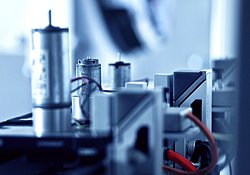Mathematische Modelle beschleunigen den Testbetrieb
Elektromotoren sind im modernen Fahrzeugbau allgegenwärtig. Neben Antriebskonzepten für Elektro- bzw. Hybrid- und Leichthybridfahrzeuge spielen E-Motoren auch bei Sicherheitssystemen und Fahrzeugkomfort-Komponenten eine wichtige Rolle. Um höchste Qualität zu garantieren, ist in der Serienfertigung eine umfassende Motordiagnose im End-of-Line-Prüfstand gefragt.
Mit der imc Parameteridentifikationsmethode (PI) stellt die imc Meßsysteme GmbH (Hersteller) gemeinsam mit ihrem Partner ADDITIVE (Systemhaus) eine schlüsselfertige Prüfstandslösung für die vollständige Prüfung und Charakterisierung von Elektromotoren vor.
Die Vorteile des PI-Verfahrens werden im Vergleich mit einem konventionellen Prüfstand deutlich, der ein Testobjekt mit einer definierten Last betreibt (z.B. mit angekoppeltem Lastmotor). Dadurch fallen umfangreiche Rüstzeiten an, die – somit ist der konventionelle Prüfstand für Serienprüfungen unwirtschaftlich. Mit dem Parameteridentifikationverfahren (PI) lässt sich Zeit und Geld sparen. Bei dieser Methode wird der zu testende Motor durch seine eigene Trägheit belastet. Geeignete Ansteuer-Algorithmen schaffen alle für die Beurteilung des Motorverhaltens notwendigen Betriebssituationen.
Dieser neue Weg bei der Beurteilung von Motoren macht sich das Wissen über die Struktur des Motors zunutze. Diese Kenntnisse lassen sich in Form von Modellen für den mechanischen und elektrischen Teil des Motors hinterlegen. Die Motorspannung stellt im PI-Verfahren die Eingangsgröße und der Motorstrom die Ausgangsgröße des zu beschreibenden Modells dar. Beide Größen lassen sich einfach und direkt während der dynamischen Ansteuerung messen und erlauben die Modellparameter wie z.B. Motorwiderstand, Reibkonstanten etc. zu bestimmen. Die so errechneten Parameter bilden das Prüfergebnis, das eine vollständige statische und dynamische Beurteilung des Testobjekts ermöglicht. Der Vergleich mit erwarteten Sollwerten bildet ein qualifiziertes Verfahren für den End-of-Line-Test.
Die imc Meßsysteme GmbH beschäftigt sich seit fast 25 Jahren mit diesem Thema und hat zahlreiche PI-Prüfständen installiert.
Mit den stets verfeinerten Methoden ist es möglich, unterschiedliche E-Motoren innerhalb eines wenige Sekunden dauernden Tests vollständig zu prüfen. Die imc PI-Prüfstände sind nicht nur viel einfacher, sondern auch erheblich ökonomischer als ein konventioneller E-Motoren-Prüfstand.
Weitere Informationen erhalten Sie auf unserer Themenseite:
Elektromotorenprüfung mit imc
Electric Motor Testing using the Parameter Identification Method
Squaring the Circle
From June 26 to 28, 2012, imc Meßsysteme GmbH is presenting efficient solutions for electric motor testing at the CWIEME Berlin, the world's largest specialist trade fair for manufacturers of electric motors, transformers and components.
Especially when it comes to serial production, not only extensive motor diagnosis in the end-of-line test stand plays an important role, time efficiency becomes a decisive factor. Achieving both high test speed (cycle time) and depth of inspection simultaneously would usually be mutually exclusive, because, according to the uncertainty relationship of measurement technology, a high depth of inspection with exact results assumes a long period of measurement.
With its Parameter Identification (PI) method, imc Meßsysteme GmbH has succeeded in squaring the circle. The PI method makes it possible to conduct rapid as well as complete testing and characterization of electric motors.
The advantage of the PI method becomes abundantly clear when compared with a conventional test stand in which the test object operates with a defined load (e.g. coupled with a load motor). Alone the mechanical coupling and time-consuming process of running through all operating points make conventional testing slow and economically unfeasible in serial production. The Parameter Identification method solves this problem, saving both time and money. According to the PI method, the motor being tested is subjected to the strain of its own moment of inertia. Appropriate control algorithms create the operating situations required for evaluating motor behavior.
This path to evaluating electric motors makes intelligent use of knowledge about the structure of the motor. This knowledge can be can be used to createf a model for the electrical and mechanical part of any motor and employed during testing.
The motor voltage in the PI method represents the input quantity and the motor current the output quantity of the model. Both of these quantities can be measured simply and directly during dynamic control and allow all model parameters – e.g. motor resistance, friction constants – to be determined. The static and dynamic parameters comprise a test result which allows a complete assessment of the test object. Comparison with anticipated set points forms a qualified method for end-of-line testing.
imc Meßsysteme GmbH has been engaged in the field of electric motor testing for almost 25 years and has installed numerous PI test stands. By constantly refining methods, imc has made it possible to carry out complete tests on different types of electric motors in a matter of seconds. The imc PI test stands are not only simpler but considerably more cost-effective than a conventional electric motor test stand.
imc Meßsysteme GmbH is presenting solutions for electric motor testing at STAND 3028 in HALL 2.2 from the 26th to the 28th of June 2012 at the COIL WINDING trade fair in Berlin.
Further information is available at www.imc-berlin.com
Information about the trade fair: www.coilwindingexpo.com





